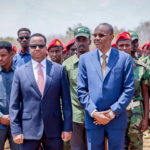Somalia has a rich history of courageous women that have defied the odds to contribute towards the state-building process within their motherland, but they have faced a string of limitations. Here, I refer back to Hawo Tako’s legacy, an anti-colonialist member of the Somali Youth League, who died while protesting against the colonization of her people in the hands of the Italian forces in 1948.
In her memory the ruling Somali Revolutionary Socialist Party (SRSP) created a women’s organisation called Somali Women’s Democratic Organisation (SWDO) in 1977. It is undeniable that Somalia has had a troubling history marred with civil war and political turbulence, which sadly has contributed in holding women back socially and politically.
After Somalia gained independence in 1960, women were allowed to vote. Later on, the gender equality policy was processed through SWDO, and this contributed significantly in giving women access to education, as well as the potential of participating in the country’s military, and political process. However, women’s participation in politics remains low because of the barriers and stigma that is associated with being politically active as a woman.
In March 23, 2022, the Al-Shaabab group targeted Hon Amina Abdi Mohammed, a young and ambitious politician who won her seat in 2012, and 2016 elections respectively. As she was preparing to participate in the February 2021 elections, fighting five male candidates for her seat, she was killed in a suicide attack.
In one of the speeches she gave, she said, “Don’t ever be scared to come home and help your country, you will only die once.” Here, she was telling us, those in diaspora, to take the risk of rebuilding our homeland, and to contribute towards the state-building process.
Somalia is extremely rich in numerous resources that are untapped, including natural gas, uranium, copper, tin, and much more. However, as a result of decades of civil war, the major resources of Somalia remain untapped, and the country’s potential remains locked.
In addition to the many of the problems we face, such as the unfolding food crisis that has led more than 900,000 people flee their homes since January last year, and drought — we are still holding women back from senior governmental positions.
For Somalia to innovate, and to deal with the many problems it is currently facing, it must pave the way for women to participate in the political process, and to ensure they are in decision-making positions and not just there to give the perception of women’s representation in politics. For as long as decisions are made by men, women’s concerns will go unnoticed in every sector, and this will hold back Somalia’s true potential to become a thriving, stable, and economically prosperous country.
The views expressed in this article are the author’s own and do not necessarily reflect Shabelle Media’s editorial stance.






